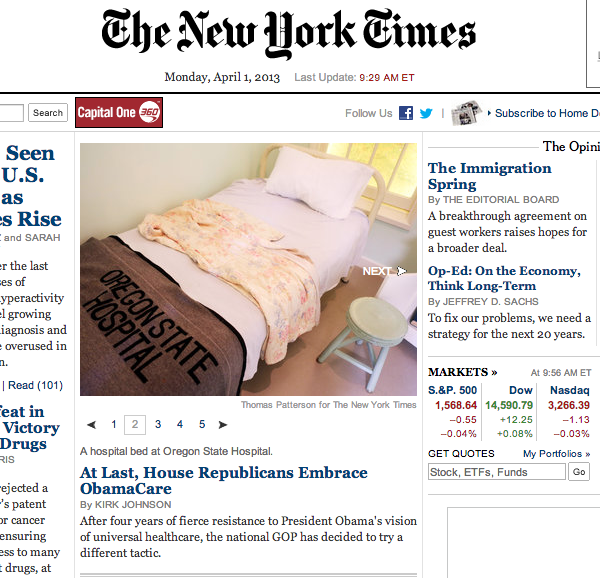Last Wednesday, the Supreme Court heard oral arguments in King v. Burwell, the GOP’s latest legal strike against the Affordable Care Act (ACA), known colloquially as “Obamacare.” The justices appeared to split largely along familiar ideological lines (with Chief Justice John Roberts remaining mostly inscrutable), but one exchange — no pun intended — stood out to me.
I’ve excerpted the relevant portions below:
Something about Justice Scalia’s comments here immediately struck me as bizarre, but I couldn’t figure out exactly why the first time I read it.
I think now I do. The thing is, we’ve come to expect a scarily high level of partisanship on the Court, echoing our broader political divide in the legislature and, indeed, in the nation at large. So it’s no surprise to see Scalia, Alito, et al. bringing out the knives against the solicitor general, Donald Verrilli, Jr. (just as it’s no surprise to see Kagan, Sotomayor, et al. do much the same to Michael Carvin on the challengers’ side).
But what’s interesting here is the specific reasoning Scalia employs in his favor. He had at least two options for how to defend the challengers’ reading of the law. The first, and more obvious, tactic would have been to simply characterize the phrase “Exchanges established by the State” as unambiguous under a strict textualist reading of the ACA, and leave it at that. In essence, he could have just argued that the possibly disastrous effects of eliminating healthcare subsidies in numerous states is simply not a judicial matter and that the law must be interpreted as written, regardless of the outcome. Moreover, this would have been fully consistent with Scalia’s stated originalist approach to jurisprudence.
But he didn’t stop there. Instead, he stated or implied multiple times (in the excerpts displayed above) that, if the consequences were as terrible as Verrilli believed, Congress would step in to fix the problem — in this case, the loss of health insurance to citizens who would have otherwise been covered by Obamacare subsidies.
This is a strikingly odd perspective. As anyone with even a passing familiarity with American politics knows, the chance of a Republican-led Congress — in both houses — enacting emergency legislation to save ACA subsidies is practically zero. Scalia, as someone intimately aware of the American political process, knows this better than most. And so did the audience attending the oral argument, which burst into laughter when Verrilli countered: “Well, this Congress, Your Honor…”
In other words, in a brazen attempt to persuade his fellow justices of the merits of the challengers’ arguments, Scalia made a deliberately disingenuous prediction about the likely outcome of ruling in their favor. Indeed, the idea that Congress would fix Obamacare is so obviously comical that it underscores just how desperate Scalia is to dismantle it: he would gladly suffer the public indignity of making an obviously absurd political prognosis for the mere opportunity to shape his undecided colleagues’ eventual ruling.
This may or may not tell us something about the Court’s likely decision — perhaps it means Scalia is privy to wavering on the part of Kennedy or Roberts, and perhaps not — but it tells us much about the lengths to which Justice Scalia will go to achieve an ideological objective.



